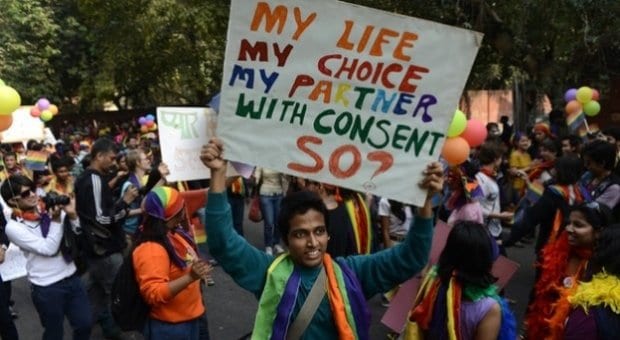The Indian Supreme Court has overturned the Delhi High Court’s 2009 ruling that decriminalized gay sex, saying Dec 11 that only the country’s parliament can change the 1861 law, widely known as Section 377, that prohibits “carnal intercourse against the order of nature.”
The New York Times reports that it is unlikely that legislators will move to act on the Supreme Court’s ruling. BuzzFeed cites the perspective of activist and journalist Vikram Doctor, who also believes that parliament would not take up the matter.
The Naz Foundation, an NGO dedicated to the fight against HIV/AIDS and the promotion of sexual health, brought the challenge against Section 377. Its executive director, Anjali Gopalan, who expressed disbelief over the ruling, is quoted as saying that justices “let down” the LGBT community and the country’s constitution.
The long-awaited ruling has angered India’s LGBT community, with many vowing to continue the fight to strike down the measure. According to an NPR report, a lawyer for the Naz Foundation has said the group intends to ask for a review of the Supreme Court’s decision, labelled a major setback for human rights in the country.
A statement issued on behalf of mental health professionals, academics, parents of LGBT children and groups like Voices Against 377 states, in part, that “it is a tragedy that this judgment forgets the vision of the founders of the Indian republic which was so eloquently captured by the Delhi High Court. By re-criminalizing LGBT persons the judgment ignores the spirit of inclusiveness which is the heart of the Indian Constitution as articulated by Jawaharlal Nehru. It equally abandons the principle of constitutional morality (ie majorities don’t have a charter to discriminate against minorities purely because they are majorities) articulated by Dr Ambedkar which is the cornerstone of a diverse and plural nation.
“The judgment is thus a deep betrayal of the fundamental constitutional promise that the dignity of all citizens would be recognized and that equal treatment is a non negotiable element of the world’s largest democracy. In this betrayal of constitutional faith, the Court has shredded the very principles it has sworn itself to uphold.”
The Delhi High Court’s 2009 ruling states that Section 377, “insofar as it criminalises consensual sexual acts of adults in private, is violative of Articles 21, 14 and 15 of the Constitution,” specifically, the right to personal liberty, equality before the law and protection against discrimination based on religion, race, caste, sex or place of birth, respectively.
“We hold that sexual orientation is a ground analogous to sex, and that discrimination on sexual orientation is not permitted under Article 15,” the judgment states.
“If there is one constitutional tenet that can be said to be the underlying theme of the Indian Constitution, it is that of ‘inclusiveness.’ This Court believes that the Indian Constitution reflects this value deeply ingrained in Indian society nurtured over several generations,” the ruling states. “Those perceived by the majority as ‘deviants’ or ‘different’ are not on that score excluded or ostracised.”
Meanwhile, Section 377’s supporters, many with links to conservative and religious organizations, hailed the Dec 11 decision, maintaining that homosexuality in unnatural and that a family constituting a father and a mother is key to children’s “normal” development, NPR notes.
In the weeks leading up to the Supreme Court’s ruling, a Times of India report noted that Section 377 is still being used to arrest LGBT people. On Nov 4, police in the city of Hassan, in Karnataka, arrested 14 people believed to be homosexuals, a move that angered activists.


 Why you can trust Xtra
Why you can trust Xtra


